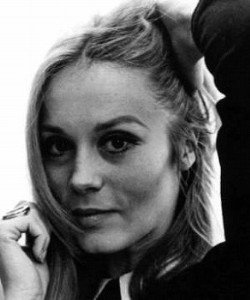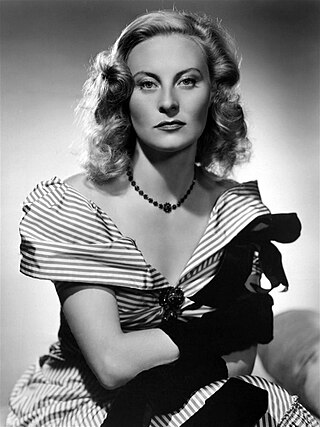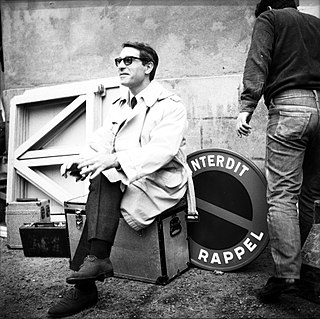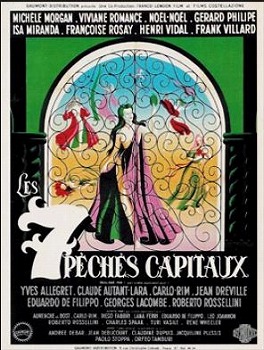
Marcel Aymé was a French novelist and playwright, who also wrote screenplays and works for children.

Françoise Paulette Louise Dorléac was a French actress. She was the elder sister of Catherine Deneuve, with whom she starred in the 1967 musical, The Young Girls of Rochefort. Her other films include Philippe de Broca's movie That Man from Rio, François Truffaut's The Soft Skin, Roman Polanski's Cul-de-sac, and Val Guest's Where the Spies Are.

Marie-José Benhalassa, known professionally as Marie-José Nat, was a French actress. Among her notable works in cinema were the sequel films Anatomy of a Marriage: My Days with Jean-Marc and Anatomy of a Marriage: My Days with Françoise (1963), directed by André Cayatte. In 1974, she received a Cannes Film Festival Award for Best Actress for her performance in the film Violins at the Ball.

Michèle Morgan was a French film actress, who was a leading lady for three decades in both French cinema and Hollywood features. She is considered one of the greatest French actresses of the 20th century. Morgan was the inaugural winner of the Best Actress Award at the Cannes Film Festival. In 1992, she was given an honorary César Award for her contributions to French cinema.

Catherine Spaak was a French-Italian actress, singer, model, and media personality. A member of the Spaak family, she was known as an iconic "It girl" in Italy during the 1960s, becoming a star of commedia all'italiana films, before later becoming prominent as a talk show host and media personality.

Jean Poiret, born Jean Poiré, was a French actor, director, and screenwriter. He is primarily known as the author of the original play La Cage aux Folles.

Jean-Claude Brialy was a French actor and film director.

Denys de La Patellière was a French film director and scriptwriter. He also directed Television series.

The 20th César Awards ceremony, presented by the Académie des Arts et Techniques du Cinéma, honoured the best French films of 1994 and took place on 25 February 1995 at the Palais des Congrès in Paris. The ceremony was chaired by Alain Delon and hosted by Jean-Claude Brialy and Pierre Tchernia. Wild Reeds won the award for Best Film.
Étienne Périer was a Belgian film director.

Les Lions sont lâchés is a 1961 French comedy film directed by Henri Verneuil, and written by France Roche and Michel Audiard (dialogue). The music score was by Georges Garvarentz and the cinematography by Christian Matras.

The Seven Deadly Sins is a 1952 French/Italian co-production motion picture drama. The film stars Michèle Morgan, Françoise Rosay, Viviane Romance, Maurice Ronet, Louis de Funès, Isa Miranda, Henri Vidal and Gérard Philipe. It has seven separate sections: with five episodes from France, and two episodes from Italy.
Jean-Jacques Gautier was a French theatre critic, novelist and essayist. A Norman via his father and a champenois via his mother, he was elected a member of the Académie française in 1972.

The Burning Court is a French-Italian-German film directed by Julien Duvivier, released in 1962. The script was written by Charles Spaak and Duvivier, from the 1937 novel of the same name by John Dickson Carr.

Il ratto delle sabine is an Italian adventure comedy film from 1961, directed by Richard Pottier, written by Edoardo Anton, starring Mylène Demongeot, Roger Moore and Jean Marais. The scenario was based on a novel of André Castelot. The film was also known under the title "L'Enlèvement des Sabines" (France), "Il ratto delle sabine" (Italy), "Les femmes de Sabine", "Der Raub der Sabinerinnen ", "El rapto de las sabinas" (Spain), "Romulus and the Sabines" (USA), "O Rapto das Sabinas" (Portugal).

Le glaive et la balance is a 1963 French-Italian crime drama film directed by André Cayatte. It was written by Cayatte, Henri Jeanson and Charles Spaak and stars American actor Anthony Perkins as the protagonist.
The Prix Victor-Rossel is a literary award in Belgium that was first awarded in 1938. The award was created by three people associated with the newspaper Le Soir: the owner Marie-Thérèse Rossel, the manager Lucien Fuss and the editor-in-chief, Charles Breisdorff.

Male Hunt is a 1964 comedy film directed by Édouard Molinaro and starring Jean-Claude Brialy, Catherine Deneuve, Marie Laforêt, Claude Rich, Françoise Dorléac and Jean-Paul Belmondo.
Éric Ollivier, pseudonym for Yves Duparc, was a French writer, screenwriter and journalist, laureate of several French literary awards.















